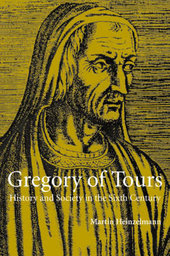
|
Gregory of Tours: History and Society in the Sixth Century
Paperback / softback
Main Details
| Title |
Gregory of Tours: History and Society in the Sixth Century
|
| Authors and Contributors |
By (author) Martin Heinzelmann
|
|
Translated by Christopher Carroll
|
| Physical Properties |
| Format:Paperback / softback | | Pages:248 | | Dimensions(mm): Height 229,Width 152 |
|
| Category/Genre | World history - c 500 to C 1500
History of religion |
|---|
| ISBN/Barcode |
9780521636384
|
| Classifications | Dewey:944.01092 |
|---|
| Audience | | Professional & Vocational | |
|---|
| Illustrations |
Worked examples or Exercises
|
|
Publishing Details |
| Publisher |
Cambridge University Press
|
| Imprint |
Cambridge University Press
|
| Publication Date |
2 November 2006 |
| Publication Country |
United Kingdom
|
Description
For over 1400 years the Histories of Gregory of Tours (538-594) - the principal work of Merovingian history - have been understood as a 'history of the Franks' and as an objective portrayal of history, albeit told by a naive narrator succeeding only in chronological organization. A new interpretation of the Histories is put forward in this 2001 book, in which the bishop of Tours can be seen to be giving each of his 'Ten Books' a self-contained topic, and also making use of the patristic method of typological biblical exegesis. By appreciating these elements, we can see clear connections between apparently unconnected, adjacent chapters, and to make out their real function. Gregory's historiographical interests can be seen as focusing on the development of a socio-political concept of society, which wishes to see the leadership of the Christian state entrusted to the joint government of bishops and king (christianus princeps).
Reviews"...even those who do not subscribe to Heinzelmann's main thesis will greatly profit from the many important findings set out in his book." Walter Goffart "[This study] marks a watershed in studies of Gregory and is the capstone of decades of this eminent scholar's work." American Historical Review "Heinzelmann's book is a good companion to Gregory's work in that it provides a comprehensive interpretation of Gregory's concept of history." Comitatus
|